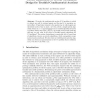Free Online Productivity Tools
i2Speak
i2Symbol
i2OCR
iTex2Img
iWeb2Print
iWeb2Shot
i2Type
iPdf2Split
iPdf2Merge
i2Bopomofo
i2Arabic
i2Style
i2Image
i2PDF
iLatex2Rtf
Sci2ools
111
click to vote
ICALP
2010
Springer
2010
Springer
On the Limitations of Greedy Mechanism Design for Truthful Combinatorial Auctions
We study the combinatorial auction (CA) problem, in which m objects are sold to rational agents and the goal is to maximize social welfare. Of particular interest is the special case in which agents are interested in sets of size at most s (s-CAs), where a simple greedy algorithm obtains an s+1 approximation but no truthful algorithm is known to perform better than O(m/ log m). As partial work towards resolving this gap, we ask: what is the power of truthful greedy algorithms for CA problems? The notion of greediness is associated with a broad class of algorithms, known as priority algorithms, which encapsulates many natural auction methods. We show that no truthful greedy priority algorithm can obtain an approximation to the CA problem that is sublinear in m, even for s-CAs with s 2.
Greedy Algorithms | ICALP 2010 | Programming Languages | Simple Greedy Algorithm | Truthful Greedy Algorithms |
Related Content
| Added | 13 Oct 2010 |
| Updated | 13 Oct 2010 |
| Type | Conference |
| Year | 2010 |
| Where | ICALP |
| Authors | Allan Borodin, Brendan Lucier |
Comments (0)

